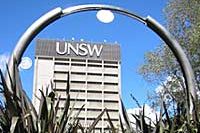| Architecture - 3260 |
|
||||||||||||||||||||||||||||||||||||||||

Program Summary
The Bachelor of Architecture degree provides academic education and practical experience leading to professional qualifications in architecture. It requires full time attendance for five years plus six months work experience that must be completed prior to the Graduation Project.
Progression through the program is by years, each comprising two semester-long design studios and their corresponding corequisites. In most years these design studios and corequisites may be taken in either order in any one year to facilitate mid-year entry to the program where required. However courses must be taken in the session they are offered at the first available opportunity. Admission to each year is subject to the successful completion of the preceding design stages and a majority of their corequisite courses, except where approval has been given by the Program Head. Program Objectives and Learning Outcomes There are two central goals. The primary goal is to equip students with the theoretical and practical knowledge, skills and techniques needed for the design, documentation and administration of building construction. A more general goal is to provide students with an all-round general problem-solving education. Lectures and practical sessions cover theoretical knowledge in the following areas:
1. Architectural Design 2. Architectural Communications 3. Architectural History and Theory 4. Architectural Technology Architectural Practice Year 1
Session 1 Session 2
Year 2
Session 1
Session 2
Year 3
Session 1
Session 2
Year 4
Session 1
Session 2
Additional Requirement
Completed after Year 1 and before Year 5
Year 5
Session 1
Session 2
General Education Requirements Students in this program must also satisfy the University's General Education requirements. For further information, please refer to the Academic Rules section and to General Education in the Table of Contents (see left-hand side of this page.
The Bachelor of Architecture degree may be awarded with honours based on the quality of performance in the program and in accordance with current program policy. Honours are Class 1 or Class 2 Division 1 or Class 2 Division 2.
In order to be considered for the University Medal, students must have completed at least 3 years of study towards their BArch degree at the University of New South Wales. 1. The degree of Bachelor of Architecture is awarded at either pass or honours level after the successful completion of a minimum of 264 units of credit.
2. To fulfil these requirements, students must complete:
3. The standard duration of the program is 5.5 years consisting of 10 semesters of full-time study (24 units of credit per semester) plus 1 semester of required work experience.
4. General Education courses may not be taken before a student enters Year 2 of the Program. 5. Students are not able to enrol in two design studios concurrently. For information regarding fees for UNSW programs, please refer to the following web-page: https://my.unsw.edu.au/student/fees/FeesMainPage.html
The Degree of Bachelor of Architecture from the University of New South Wales is accredited by the Board of Architects of New South Wales for the purpose of registration. In addition, the candidate candidate must satisfy the following requirements to become registered:
1. Produce evidence of two years approved work experience, at least one of which has been subsequent to the completion of the program; and 2. Pass an examination in Architectural Practice administered by the NSW Board of Architects. Graduates are eligible for Graduate Membership of the Royal Australian Institute of Architects. Students enrolled in the BArch program (3260) or the BSc(Arch) program (3265) or any of the combined BArch programs are eligible to become Student Members of the Royal Australian Institute of Architects. Faculty Regulations for the BArch FBE Electives
Faculty of the Built Environment (FBE) electives must be selected from those offered by the FBE. General Education Electives may not be substituted for either FBE or Open Electives. Work Experience Each student is required to undertake 24 weeks of off-campus activity in the pursuit of architectural work experience. Ideally, this is undertaken as a single block of time working in an architectural design office. Where this is the case and it overlaps a normal academic session, students should enrol in ARCH1583 and are not permitted to enrol in any other courses concurrently. Work experience may also be carried out in several smaller components during summer breaks, provided that no such component is less than eight weeks in duration. Where this is the case, students must enrol in ARCH1583 for the summer session in which they are completing their work experience requirements. If students wish to propose an alternative experience to that carried out in a registered architect's office, approval must be given by the Program Head. In all events, assessment is only within the terms of the course ARCH1583 Work Experience in the Bachelor of Architecture degree program. The Architecture Program takes no responsibility for any assessment or consideration for registration with the Board of Architects of New South Wales or membership of the Royal Australian Institute of Architects. Composite Courses Where a composite course is failed, all component parts must be repeated. This includes the courses in the technology core. To achieve a pass result in technology core courses, at least two components must be passed. Progression After Year 2, progression in the Design stream requires a pass level to be gained in the previous session's Design Studio. No two design studios can be taken concurrently. A Progress Portfolio will be submitted at the end of third year as part of the assessment for ARCH1302 and to determine progression into fourth year of design. Similarly another Progress Portfolio will be submitted at the end of fourth year which will determine progression into final year. A Progress Portfolio will also be submitted during third year as part of the assessment for ARCH1371 and to determine progression into the fourth year course ARCH1470. Area(s) of Specialisation |
|||||||||||||||||||||||||||||||||||||||||

| Contacts | Library | myUNSW | WebCT |